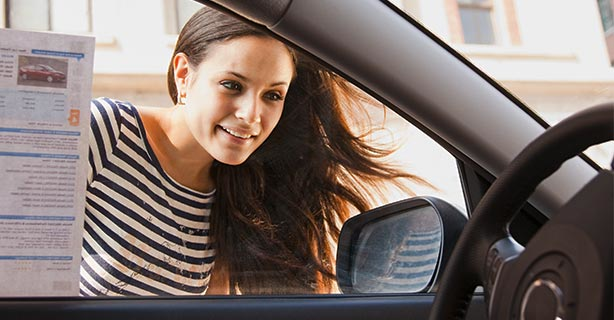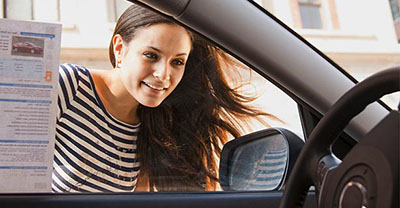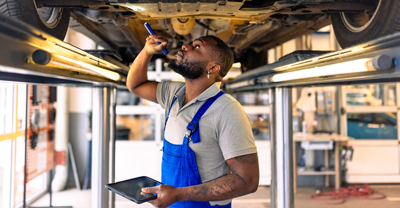Why automotive safety ratings matter when buying a car


0 min. read
When you're in the market for a new or used vehicle, it's easy to get caught up in the anticipation of finding the perfect ride at the lowest price. However, amidst all the fun features and aesthetics, one crucial aspect often gets overlooked: automotive safety ratings. Understanding these ratings can make a significant difference in your decision-making process. Here's why they matter.

What are automotive safety ratings?
Automotive safety ratings assess how well a vehicle protects its occupants in a crash and how effective its safety features are in preventing accidents. These ratings come from organizations that conduct rigorous tests and evaluations.
Who tests car safety?
The most well-known rating agencies are:
National Highway Traffic Safety Administration (NHTSA): A U.S. government agency that uses a 5-star rating system to assess vehicle safety based on frontal, side, and rollover crash tests. Ratings and information are available at safercar.gov.
Insurance Institute for Highway Safety (IIHS): An independent organization that evaluates crashworthiness, crash avoidance technology, and headlight performance. Vehicles that perform well may receive a "Top Safety Pick" or "Top Safety Pick+" award. Ratings and information can be found at iihs.org.
Why should you care about safety ratings?
Protecting lives: Higher-rated vehicles are designed with advanced safety features like airbags, anti-lock brakes, and electronic stability control, reducing the risk of severe injuries or fatalities in an accident.
Lower costs: Safer cars could save you money because they're often less expensive to insure and less likely to get badly damaged in accidents.
Driving confidence: Knowing your car meets top safety standards can help you drive with confidence, especially in challenging conditions or with loved ones on board.
What do automotive safety ratings mean?
While safety tests simulate real-world crashes, no test covers every possible scenario. Here’s how to interpret the results:
NHTSA 5-star ratings
5 stars: Highest safety rating, offering strong crash protection.
4 stars: Good protection but may have minor safety concerns.
3 stars or fewer: Higher risk of injury in an accident.
IIHS safety awards
Top Safety Pick+: Highest scores in all crash tests, superior crash prevention, and good headlights.
Top Safety Pick: High marks in crash tests and advanced safety features but may have minor weaknesses.
Must-have safety features
When you’re shopping for a car, look for these safety features:
Airbags: Front airbags are standard, but side and curtain airbags provide additional protection.
Anti-lock Braking System (ABS): Helps prevent wheel lockup during hard braking, improving control.
Automatic Emergency Braking (AEB): Detects obstacles and applies brakes to help prevent collisions.
Blind-spot monitoring: Alerts you to vehicles in your blind spot.
Electronic Stability Control (ESC): Helps prevent skidding and loss of control.
Strong structure: A well-designed structure helps absorb and dissipate crash forces effectively.
Safety assessments for used cars
Many late-model used cars offer excellent safety features. You can check a vehicle’s safety rating by entering its make and model on the IIHS or NHTSA websites. These ratings assess:
Crashworthiness: How well the car protects occupants in a crash
Crash avoidance/mitigation: Features that help prevent crashes
Checking for recalls
Before buying any used vehicle, check for recalls using NHTSA’s recall lookup tool. This helps ensure the car doesn’t have unresolved safety issues.
Researching safe and affordable used cars
Consider Certified Pre-Owned (CPO) vehicles: These undergo rigorous inspections and often include updated safety features and warranties.
Factor in insurance costs: Vehicles with high safety ratings may qualify for lower insurance premiums. Check with your insurer.
Looking at top used car safety picks
For example, according to Cars.com, some of the safest used vehicles (model-year 2016 or older) include:
2005–14 Volvo XC90®
2007–16 Volvo S80®
2016 Hyundai Sonata®
2011–16 Mini Countryman®
2015–16 Kia Sedona®
Your safety matters most
Vehicle safety is an important factor when choosing your next car. Understanding safety ratings and researching crash test results can help you make a well-informed decision. Whether you're considering a new or used vehicle, prioritizing safety features can contribute to greater protection on the road.
If you have questions about insurance for the car you're considering—no matter the type or model—our team at Dairyland®, a brand of the Sentry Insurance Group, is here to help. Contact us today.

The general information in this blog is for informational or entertainment purposes only. View our blog disclaimer.










